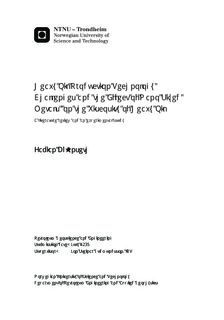| dc.description.abstract | Heavy oil and bitumen make up 70% of the discovered petroleum resources in the world. Only a very small fraction of these resources have so far been produced, as the recovery techniques available for heavy crudes and oil sands have traditionally been far more expensive than those of conventional oil. However, discovery of easy oil is becoming rarer and rarer, and with oil prices stabilizing at over $100/bbl, oil companies are turning to unconventional resources to satisfy the needs of the market. This sets the ground for heavy oil to make up a larger part of the energy mix in the near future. This thesis examines the main technological challenges of producing and transporting heavy oil. Much work has been done to improve the efficiency of the upstream and downstream sector, while the midstream has not yet been subject to the same focus. However, this is often a very significant part of the expenses in a heavy oil field development. If the greatest challenges can be addressed and handled properly, there is a significant potential for new projects to become economically feasible.This thesis also covers a set of lab experiments performed, where nano-sized metal particles are mixed into a heavy crude oil. Nano-particles have seen an increased industry focus over the last decade, with several research projects utilizing them to improve oil recovery factor. In China, several studies have utilized nano-sized metals to catalyze an in-situ upgrading of the heavy oil, in order to decrease viscosity and improve recovery factors. This thesis studies the application of these catalysts in topside facilities at the wellsite, as a significant reduction of viscosity will reduce the need for pumps and flow assurance installations. It is also studied how heating the oil by microwaves may affect viscosity, and how nano-sized metals may impact this process. | nb_NO |

